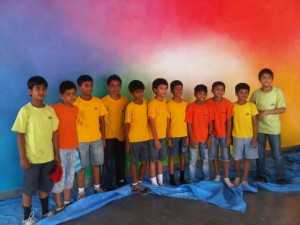Waldorf (Rudolf Steiner) Education:
Dr. Rudolf Steiner was not in the habit of preaching, or giving instructions of his own accord. Like a true master of esoteric knowledge, Dr. Steiner always waited to be asked. His many new impulses arising out of Anthroposophy have always been in response to questions put to him by his many friends and students. When someone approached him with a specific wish, or to ask for advice, he gave the answer that would lead to a new initiative. One such request came from Emil Molt, a friend of Rudolf Steiner. This led to the starting of the WALDORF (RUDOLF STEINER) SCHOOL movement.
 The first Free Waldorf School was inaugurated in Stuttgart in September 1919. Its founder, Emil Molt, owner and chief director of the Waldorf Astoria cigarette factory, had started on an industrial training programme for adults, shortly after the First World War, and was now keen to start a school for the children of his factory employees. He felt that the social question was a question of human dignity and ethics, which in turn was ultimately a question of education. Rudolf Steiner took over the leadership of the new school, which was to be a model and would have wide-reaching social influence. The Waldorf Schools were expected to meet an acute social need and thereby contribute to the fulfillment of a public duty.
The first Free Waldorf School was inaugurated in Stuttgart in September 1919. Its founder, Emil Molt, owner and chief director of the Waldorf Astoria cigarette factory, had started on an industrial training programme for adults, shortly after the First World War, and was now keen to start a school for the children of his factory employees. He felt that the social question was a question of human dignity and ethics, which in turn was ultimately a question of education. Rudolf Steiner took over the leadership of the new school, which was to be a model and would have wide-reaching social influence. The Waldorf Schools were expected to meet an acute social need and thereby contribute to the fulfillment of a public duty.
The Waldorf Curriculum is based upon a true insight into the child’s development, not only the physical and mental development, but also its connection to the soul and the spirit. The understanding of the three-fold human being, as expressed in the soul forces of thinking, feeling and doing (will-activity), forms the basis of this education.
Structure of the Waldorf/Rudolf Steiner School:
Waldorf /SteinerSchools can and should be organised according to their local conditions and need to be rooted in the local culture. In most cases there is a Kindergarten within the school; in some schools there may be classes for children with special needs. All children are taught in their respective age groups, without any child having to repeat a class. From Class One to Class Eight the children have the same class teacher who teaches most subjects during the two-hour Main Lesson, but from Class Nine onwards, there are specialised Subject Teachers, and the children may be divided into groups according to their abilities. In general, children work on the same curriculum, regardless of their abilities, social background or professional goals. This is a unique form of social co-education and demands a special method of teaching, so that the able children have enough challenge and the slower ones do not feel neglected. There is no selective segregation of abilities up to Class Eight, and experience shows that this system does not damage the learning ability, but that it develops social skills to a high degree. This helps in coping with late developers and in practice also supports the theory that that learning ability is less dependent on hereditary forces and much more on the skills of educational methods and the ability to awaken dormant forces in the growing child. There is equal emphasis on the subjects of the head, the heart and the limbs; subjects are taught in an artistic and imaginative way which leads to creativity and freedom of thought.
The Time Table:
The day begins with MAIN LESSON in Waldorf /Steiner schools. In Main Lesson, which lasts for about two hours, the teacher teaches the same subject over a period of three to four weeks, known as a block, in a total immersion method which helps in the concentration, deepens the understanding of the subject and makes use of the natural rhythm of learning. There are no text-books – the subject is explored through narrating, writing, reading, painting, drawing and even by acting it out. The artistic element is very strong as it stimulates the imagination and the feeling. Children are encouraged to do their own research and make projects on the subject, which they compile and illustrate in their Main Lesson books. These are good substitutes for text-books. The Main Lesson is followed by a break, after which subjects which need regularity are taught: foreign/second language, art, music, handicraft, Eurythmy, dancing, singing, clay-modelling, woodwork, gardening, sports, etc.
Reports, Exams, Transition into vocational life:
Waldorf/Steiner schools do not give reports in the form of marks or grades, but through the teachers’ verbal/written assessment which describes the child’s temperament, his/her behaviour, strength and weakness, general progress in the various subjects throughout the year and ends with a small verse which the class teacher composes individually for each child, in order to help the child during the coming year, almost like a prayer. This form of report is accepted by other schools or institutions, which the child may change over to, but if a mark-sheet is needed, the Waldorf teacher will readily oblige.
The secure, protective space of the lower and middle school, which must be maintained for valid pedagogical reasons, gradually opens out in the upper school in order to prepare the pupils for the board exams. The Waldorf/Steiner school may decide to go up to Class Seven with the Class Teacher and then spend the next three years preparing the pupils for the Class Ten board exam.
In India there are Waldorf/Rudolf Steiner Schools as well as Waldorf-inspiredSchools. There are also Teacher Training Seminars and Courses, where participants learn about the basic tenets and underlying principles of Waldorf Education. This enables them to teach in a WaldorfSchool, or to use the knowledge even in conventional education.
 |
| Sloka, The Hyderabad Waldorf School Plot 287 , Rd# 25 Jubilee Hills, (off Rd #10 Jubilee Hills, next to Cafe Irani Chai) Hyderabad 500033.Tel # +91 40 23545206/65994510 Tel # +91 08413 235050 Email: info@slokawaldorf.org Website: www.slokawaldorf.org |
 |
| Abhaya, a Waldorf School Gundlapochampally Village Near Apparel Textile Park Kompally RR District – 500014Tel #+91 8008222056; Tel # +91 8008222356 E-mail: info@AbhayaSchool.org Website : http://www.abhayaschool.org/ |
 |
| Prerana Waldorf School 47/9 Janardhan Hills (Opp. NCC Urban Apartments) Telcom Nagar Bus Stop Gachibowli ‘X’ Road Hyderabad, 500032. Land Line # +91 40 6455 5930 Cell Phone # +91 9618686016 E-mail: info@preranawaldorf.org Website:http://preranawaldorf.org |
| Bangalore Steiner School Sristi Farm, Thindlu Village, Sarjapur Hobli, Anekal Taluk, Bangalore. Mobile # Smitha Mallya # 98458 19185, Mobile # G.Manivannan # 94483 78949.E-mail: bangaloresteinerschool@gmail.com Website : www.bangaloresteinerschool.org/ |
 |
| Inodai Waldorf School Motibaug, Next to Andheri Fire Station, SV Road, Andheri West. Mumbai, MH Tel # 022-65222711 Mobile # 9819855336Email: contactus@inodai.org.in Website: www.inodai.org.in |
A checklist for the qualification and recognition of a Waldorf/Rudolf Steiner School in India.
– Compiled by Aban Bana
- The school in question should work as a “Waldorf-inspired/oriented” school for a minimum period of two years, before it can apply for full Waldorf recognition.
- The Waldorf-inspired school should make sure that its teachers get regular in-service training as well as training at recognised Waldorf education seminars, workshops and courses.
- If a school is founded by a minimum of three trained Waldorf teachers, it may carry the “Waldorf” name from the very beginning.
- Waldorf schools are non-profit institutions.
- The school seeking recognition should apply to Jyotsna Patnaik, Indian representative for the Hague Circle.
- The class teacher should be prepared to teach the pupils from Class One through to Class Seven.
- Check on Class One readiness of pupils as indicated.
- The complete Waldorf curriculum, modified to suit local needs, and covering all recommended subjects, should be followed by all teachers.
- The day begins with a two-hour Main Lesson, in which a subject is taught in blocks of three or four weeks by the class teacher.
- It continues with other subjects appropriate for the class, taught by subject teachers or even the class teacher.
- The methodology has to be child-centered.
- All festivals should be celebrated in an appropriate way as India is a multi-cultural, multi-religious land.
- Every Thursday the teachers have a structured faculty meeting, which includes study, artistic activity and an agenda to serve the smooth running of the school.
- There have to be regular teacher-parent meetings for all classes and also sessions for inducting parents into Waldorf education.
- Home visits (to the homes of the pupils) by the class teacher have to be made on a regular basis.
- At the end of the year the teachers have to write a report, which includes a birthday verse, for each individual pupil.
- Once the school has been running as a PROPER Waldorf/Rudolf Steiner school for a minimum period of two years, it can form a “College of Teachers”.
- “Meditatively Acquired Study of Man” and “Republican Academies” are two books which the College of Teachers can read together.
- The members of the College of Teachers are responsible for delegating activities like fund-raising, informing the general public and looking for a venue in an ethical way.
- Teachers need to have a sound knowledge of Anthroposophy, and to deepen their practice of meditations given by Rudolf Steiner for Waldorf teachers.
